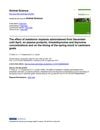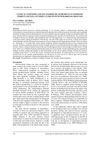 21 citations,
December 2012 in “Maturitas”
21 citations,
December 2012 in “Maturitas” Testosterone implants in women require pharmacological dosing to be effective and are generally safe and well-tolerated.
1 citations,
March 2006 in “The FASEB journal” Keratin-based scaffolds are safe and effective for tissue engineering.
 51 citations,
January 2004 in “Domestic animal endocrinology”
51 citations,
January 2004 in “Domestic animal endocrinology” Melatonin implants and long daylight hours alter the timing of hormone release and hair growth in mouflon sheep.
 January 2024 in “International Journal of Health Science”
January 2024 in “International Journal of Health Science” Hormonal implants have many side effects that often outweigh their benefits.
 10 citations,
April 1995 in “Animal Science/Animal science”
10 citations,
April 1995 in “Animal Science/Animal science” Melatonin implants can change the seasonal prolactin levels and hair growth in adult cashmere goats but not in juveniles, and don't delay spring moult for better fiber harvesting.
 2 citations,
March 2004 in “Reviews in Gynaecological Practice”
2 citations,
March 2004 in “Reviews in Gynaecological Practice” Hormonal changes and psychological issues can cause sexual dysfunction in postmenopausal women. Behavioral therapy is recommended first, with hormone replacement helping some symptoms but not libido. Testosterone can improve libido, but its effects on overall sexual function are unclear. Emotional and relationship issues should be addressed before using medication, and the benefits and risks of testosterone supplementation should be considered.
 22 citations,
January 2013 in “Journal of The American Academy of Dermatology”
22 citations,
January 2013 in “Journal of The American Academy of Dermatology” Birth control pills can help manage acne, but dermatologists should know their skin-related side effects, especially when prescribing drugs that can harm unborn babies.
 2 citations,
April 2023 in “Pharmaceuticals”
2 citations,
April 2023 in “Pharmaceuticals” Testosterone therapy for postmenopausal women appears safe and may protect against heart disease, but requires constant monitoring and more research for long-term effects.
 72 citations,
December 1996 in “Journal of Investigative Dermatology”
72 citations,
December 1996 in “Journal of Investigative Dermatology” Human hair follicles can regenerate after removal, but with low success rate.
 37 citations,
February 2013 in “Maturitas”
37 citations,
February 2013 in “Maturitas” Testosterone therapy is beneficial for women's health and does not cause masculinization or liver damage, and it protects the heart and breasts.
 162 citations,
April 2016 in “The Lancet Diabetes & Endocrinology”
162 citations,
April 2016 in “The Lancet Diabetes & Endocrinology” Testosterone therapy in transgender men has both desired effects like increased muscle mass and potential health risks such as higher cardiovascular risk.
 81 citations,
May 2007 in “Fertility and Sterility”
81 citations,
May 2007 in “Fertility and Sterility” Testosterone therapy seems safe for postmenopausal women for a few years, but more research is needed for long-term effects.
 61 citations,
January 2017 in “Human Reproduction Open”
61 citations,
January 2017 in “Human Reproduction Open” The review recommends hormone replacement therapy for women with premature ovarian insufficiency to manage symptoms and protect health, with specific approaches for different groups.
 51 citations,
April 1999 in “The Journal of Steroid Biochemistry and Molecular Biology”
51 citations,
April 1999 in “The Journal of Steroid Biochemistry and Molecular Biology” Testosterone replacement may improve sexual desire and bone health in women with low androgen levels, but more research is needed on its long-term safety.
 46 citations,
January 2008 in “Climacteric”
46 citations,
January 2008 in “Climacteric” Testosterone therapy can help improve sexual desire and function in postmenopausal women but may cause side effects and is not FDA-approved for this use.
 32 citations,
December 1999 in “Journal of Investigative Dermatology Symposium Proceedings”
32 citations,
December 1999 in “Journal of Investigative Dermatology Symposium Proceedings” 17-β-Estradiol applied to the skin stops hair growth, while ICI 182 780 helps hair grow in mice.
 14 citations,
May 2021 in “Marine Drugs”
14 citations,
May 2021 in “Marine Drugs” PDRN, derived from salmon sperm, shows promise in healing wounds, reducing inflammation, and regenerating tissues, but more research is needed to understand its mechanisms and improve its use.
 10 citations,
April 2006 in “Seminars in Reproductive Medicine”
10 citations,
April 2006 in “Seminars in Reproductive Medicine” Testosterone therapy may improve mood, well-being, and sexual function in premenopausal women, but more research is needed on its long-term safety and effectiveness.
 9 citations,
June 2002 in “Best Practice & Research in Clinical Obstetrics & Gynaecology”
9 citations,
June 2002 in “Best Practice & Research in Clinical Obstetrics & Gynaecology” Testosterone therapy can help women with androgen deficiency by improving energy, sex drive, and bone health with few side effects.
 6 citations,
September 2005 in “Expert Opinion on Pharmacotherapy”
6 citations,
September 2005 in “Expert Opinion on Pharmacotherapy” Androgen therapy can help with symptoms like low libido in women, but more research is needed to understand its long-term safety and effects on health.
 6 citations,
September 1998 in “The Journal of The British Menopause Society”
6 citations,
September 1998 in “The Journal of The British Menopause Society” Testosterone replacement may help postmenopausal women with sexual function and bone density, but suitable treatments are limited.
 3 citations,
July 2018 in “JAAPA”
3 citations,
July 2018 in “JAAPA” Some birth control pills can cause hair loss, and switching to ones with less androgen should help.
 3 citations,
January 2011 in “Female pelvic medicine & reconstructive surgery”
3 citations,
January 2011 in “Female pelvic medicine & reconstructive surgery” Hormones significantly affect women's sexual function, and more research is needed to improve treatments for sexual dysfunction with minimal side effects.
 2 citations,
November 2012 in “InTech eBooks”
2 citations,
November 2012 in “InTech eBooks” The document concludes that sex hormones are crucial for mammalian reproduction, health, and behavior, and require more research for therapeutic use.
 1 citations,
December 2017 in “Research for Rural Development/Research for Rural Development (Online)”
1 citations,
December 2017 in “Research for Rural Development/Research for Rural Development (Online)” Neutered ferrets often develop hyperadrenocorticism, with symptoms like hair loss and lethargy, and androstenedione is a key indicator for diagnosis.
 1 citations,
April 2006 in “Seminars in Reproductive Medicine”
1 citations,
April 2006 in “Seminars in Reproductive Medicine” Androgen therapy might help some women with low libido, but it has risks and should be used carefully.
 January 2020 in “Der Pharmacia Lettre”
January 2020 in “Der Pharmacia Lettre” Nanoparticle-based herbal remedies could be promising for treating hair loss with fewer side effects and lower cost, but more research is needed.
 October 2007 in “Postgraduate obstetrics & gynecology”
October 2007 in “Postgraduate obstetrics & gynecology” Testosterone therapy can help postmenopausal women with low sexual desire but needs more safety research and should be used with estrogen therapy.
 October 2007 in “Postgraduate obstetrics & gynecology”
October 2007 in “Postgraduate obstetrics & gynecology” Testosterone therapy can help with androgen deficiency in women but should be used with caution and monitoring due to potential risks.
 April 2006 in “Current Opinion in Endocrinology & Diabetes”
April 2006 in “Current Opinion in Endocrinology & Diabetes” Testosterone therapy can help improve sexual function, mood, and bone density in women with low androgen levels, but more research is needed on long-term safety.





























